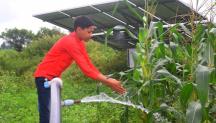

-
-
IRENA Coalition for Action (2021), Community Energy Toolkit: Best practices for broadening the ownership of renewables, International Renewable Energy Agency, Abu Dhabi.
Copied
/-/media/Files/IRENA/Coalition-for-Action/IRENA_Coalition_Energy_Toolkit_2021.pdf
Copied
Community Energy Toolkit: Best practices for broadening the ownership of renewables
Newsletter
The IRENA Coalition for Action brings together leading renewable energy players from around the world with the common goal of advancing the uptake of renewable energy. The Coalition facilitates global dialogues between non-governmental and governmental stakeholders to develop actions that increase the share of renewables in the global energy mix and accelerate energy transitions. The Coalition’s Working Group on Community Energy focuses on driving community energy investments and promoting policies that empower communities and citizens to participate in energy decision making.
Using a case study approach, the white paper highlights the different ways in which communities actively participate in energy decision making around the world and harness renewable energy’s potential to deliver economic, social and environmental benefits for a just transition. The paper also provides a checklist and additional resources that energy communities could consider when developing a renewable energy initiative. The following key takeaways from 11 featured case studies may serve as inspiration for communities on how to set their initiatives up for success:
- Communities should identify opportunities to make productive uses of renewable energy and amplify its benefits.
- Communities should nurture dialogue among community members to foster a shared purpose and leverage knowledge and experience from the group to take their initiatives forward.
- Communities should invest time in building capacity through technical training in renewables, developing an understanding of regulatory requirements and government policies, and acquiring the necessary financial know-how to develop business plans for their community energy initiatives.
- Community energy can be a vehicle for gender and youth equity next to inclusiveness.
- Many successful community energy initiatives are the product of partnerships.
- When working with partner organisations, communities should help their partners develop an understanding of local contexts and their values and needs.
- Communities can turn to other communities for inspiration and guidance.




